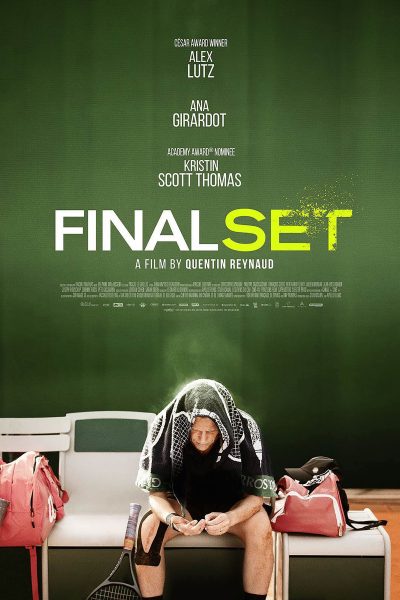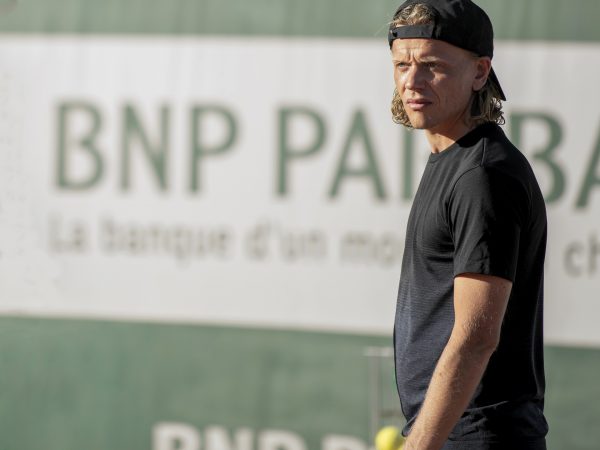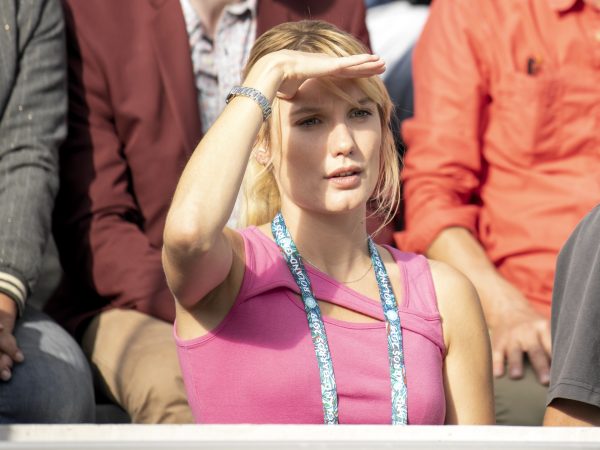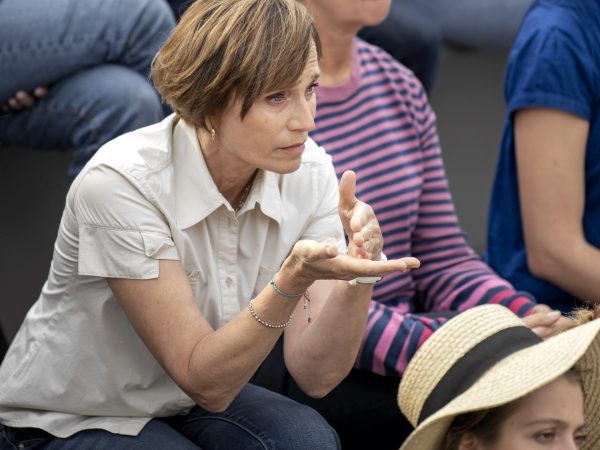
“Final Set”(“Cinquième set”) (2020 production, 2021 release). Cast: Alex Lutz, Ana Girardot, Kristin Scott Thomas, Jürgen Briand, Quentin Reynaud, Alexandre Angelo Bettanini, Yanaïs Laurent, Victor Ouvrard, Leny Mitjana, Tariq Bettahar, Fabienne Galula, Thierry de Carbonnières. Director: Quentin Reynaud. Screenplay: Quentin Reynaud. Web site. Trailer.
When we move toward – or pass – our prime, we may begin to look upon ourselves and our accomplishments with some dismay, especially if we haven’t lived up to expectations. With the clock ticking ever faster, we might well view our circumstances with melancholy and disappointment, no matter how well or how poorly we may have done. But we need not be stuck with a grim future or a legacy of regret. Comebacks are indeed possible, as seen in the new French sports drama/character study, “Final Set”(“Cinquième set”).
Thirty-seven-year-old French tennis star Thomas J. Edison (Alex Lutz) is facing an uncertain future. The onetime teen phenom has watched two decades of competition fly by without achieving the payoff he was expected to realize. In recent years, his aging body has begun to fail him, necessitating several knee surgeries followed by ongoing rigorous physical therapy. But, prior to that, Thomas had other problems to contend with, most notably wrestling with demons of never living up to his potential. Consequently, he’s spent most of his peak playing years frustrated, waiting for a break that has never come.
To make matters worse, during that time, he’s been under constant pressure from the sports press, routinely bombarded with harsh denunciation over his failure to perform. And, at times, he’s also been hit with comparably cruel criticism from sources closer to home, most notably his disapproving mother, Judith (Kristin Scott Thomas), owner of a prominent Paris tennis club, who has been relentlessly disappointed that her own flesh and blood has let her down in a profession in which she is herself so heavily invested. So much for motherly love.
Given his age, physical condition and track record, Thomas is now squarely staring down the end of his career, despite his often-pathetically forlorn protests to the contrary. He’s having increasing trouble making the cut for tournaments (even lesser-known ones) and, consequently, not being taken seriously. And, on top of this, he’s also having to sit back and watch the rise of a new teenage superstar, fellow French countryman Damien Thosso (Jürgen Briand), a player often compared to a young Edison – but without the unfortunate habit of cracking under pressure.

Despite his dogged determination to carry on, there are those in Thomas’s life who wouldn’t mind seeing him slow down and prepare for retirement. That’s particularly true of his wife, Eve (Ana Girardot), a onetime tennis player who has given up the sport to pursue other interests, such as going back to school. Given the new direction in her life, she could use more help around the house, especially in caring for their young son, Gaspard (Alexandre Angelo Bettanini). She’s also concerned that Thomas may be seriously deluding himself about what lies ahead, particularly the slim hope of him ever attaining the success that has always eluded him – and that he’s not likely to achieve in the playing time he has left. The growing strain in their relationship does not bode well for the future of their marriage.
However, Thomas is not about to give up, despite the physical and mental challenges, not to mention all the criticisms, no matter where they come from. After rejections from several tournaments, he decides to make a run at competing in the prestigious French Open, an event in which he has a chance (albeit slight) at qualifying by playing in several preliminary rounds. It’s a long shot, to be sure, but, if he focuses on his game and the breaks fall his way, he just might experience a breakthrough. It would also be a source of redemption for Thomas, given that this same tournament marked the beginning of his downward spiral, choking at a critical point in the competition. It was a devastation from which he never recovered, but now maybe he has an opportunity to make up for that – and to show others that the potential never went away; it just took time to surface.
Much to everyone’s surprise, Thomas is unexpectedly successful. Commentators and sports journalists are quick to note that he’s playing much the same way he did in his youth. For his efforts, he even lands the backing of a commercial sponsor (Fabienne Galula). But, despite such success, the strain continues to grow between Thomas and Eve, just at a time when he could use her support most. And, just when it seems like things couldn’t get any more tense, he learns who his next opponent will be – Damien Thosso. It’s match that will not only test his abilities, but it will also bring him face to face with his own past, taking on an opponent the same age he was when everything fell apart. What outcome can he expect this time?

When we’re convinced that it’s possible to achieve a particular objective, no matter what the odds, that’s a prime example of determination at work. Yet, in the face of such circumstances, many would likely look at us and think we’re daft. But somehow we’re convinced that carrying on is an attainable goal.
Why is that? Is it a reasonable assessment? Wishful thinking? Lunacy run amok? More than anything else, it’s a belief in ourselves and our abilities, one based on supreme confidence and backed by a boatload of courage. And recognizing the significance of that belief is crucial, for it drives the conscious creation process, the philosophy that maintains we manifest the reality we experience through the power of those intent-based resources.
The determination Thomas exhibits is quite evident and only grows stronger as his story unfolds. He genuinely believes he can accomplish what he’s set out to do, despite the drawbacks and the criticisms that have been so freely heaped upon him. In fact, the criticisms could even be helping him by making him more determined, more committed to seeing through on his ambitions, no matter how Quixotic they may appear to others.
That belief in oneself is important to anyone undertaking a particular venture, especially one with long odds. It provides the motivation necessary to carry forward, regardless of what we may be up against. Even if we experience setbacks along the way, that steely resolve often provides the drive and energy to continue, to find ways to rebound from errors and overcome obstacles on the path to arriving at our chosen destination. Thomas embodies this concept in virtually all of his efforts to continue competing and capture the prize he so concertedly seeks.

To put oneself into such a state of mind, though, there are other challenges to be surmounted. Most notably there’s the need to face our fears and get past them. As with anything we manifest as conscious creators, fear is something that can be materialized or dispensed with, depending, again, on our beliefs. If we allow fear-based beliefs to hold sway over us, we’ll never attain our goals, for those apprehensions will undermine our efforts at every turn, essentially cancelling our intents, no matter how strongly we hold onto them.
The solution, of course, is to embrace beliefs that are the antithesis of our fears. By choosing to live courageously, we eliminate the apprehensions that would otherwise hold us back. In fact, those empowering heroic sentiments can even energize us, impelling us to ever greater heights of success and attainment. Fewer things can motivate someone seeking to achieve than a courageous outlook, especially when confronted by naysayers spouting the contrary. And, as Thomas plays his way through the Open’s qualifying rounds, he begins to clearly see that for himself.
What’s perhaps most important to recognize in all this is that it’s never too late for a comeback. When we reach a certain point in our lives and careers, many of us embrace various assumptions about ourselves, most of them having to do with giving up hopes of ever returning to previous levels of capability and the prospects of recapturing them. But that only need be the case if we adopt beliefs related to those notions. As Thomas often points out in the film, there are a number of tennis players who achieved their greatest successes at ages older than he is now. Granted, their examples may not be the norm, but fulfilling such achievements is indeed possible, and Thomas would like to believe that he’s one among them. As long as he holds fast to those convictions, he just might succeed. It’s an example that we can all follow, too, whether we’re tennis players, ballerinas or practitioners of any other adventurous endeavor. And it’s comforting to know that the game may not be over when most of us tend to think it’s ended.

This is particularly noteworthy for those of us seeking to redeem ourselves for past failures. Those previous disappointments may have taken quite a toll on us. They may have discouraged us from continuing to try. Or they may have haunted us for years as we’ve resolutely sought to saunter on, constantly reminded of our shortcomings. And, through it all, we may have continually wondered whether we’ll ever live up to what we know we’re capable of. But getting another chance – and believing we’ll succeed at it – can wipe away all of those frustrations, offering us the redemption we’ve long sought. Could that be what’s awaiting Thomas? He’ll soon find out.
It’s easy for sports movies to fall into the trap of being corny, clichéd and trite. However, director Quentin Reynaud’s second feature takes the genre a step further, serving up an engaging, thoughtful character study about a determined but aging French tennis star seeking a comeback and redemption. While some elements of the story are a little repetitive and occasionally predictable, the film nevertheless offers viewers a fresh take on issues like drive, obsession and the price we’re willing to pay to realize a cherished goal, no matter what the milieu. The picture’s fine performances, ethereal score and artfully filmed tennis matches mix well, adding to a narrative that seeks to go beyond the expected and ordinary. “Final Set” definitely delivers more than what one might anticipate, advancing a genre that all too often takes the easy route. The film is playing theatrically and online.
Finding our way back to who and what we once were may be a challenging venture. In fact, we may not succeed at it either. But we’ll never know if we never make the attempt. If nothing else, there’s something to be said for the effort. Just as Thomas seeks to make a storied comeback, what truly matters most is that we undertake the endeavor, regardless of how it turns out. And one can hardly find fault with that.
Copyright © 2021, by Brent Marchant. All rights reserved.

No comments:
Post a Comment